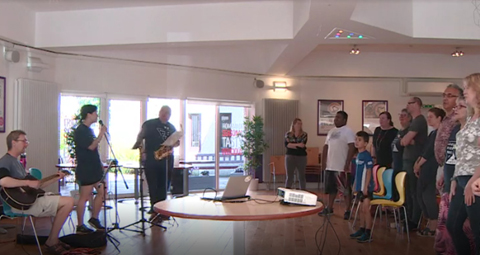August 24 | ![]() 0 COMMENTS
0 COMMENTS ![]() print
print

The empty positivity of ‘churches’ without God
Edinburgh’s religion-less Sunday Assemblies fail to challenge people to examine their character — By FR MICHAEL KANE
Often when guests visit my Presbytery around lunchtime they comment on the noise of our children in St Augustine’s playground across the road. I don’t know the collective noun for 300 screaming school pupils, but whatever it is it should suitably describe the deafening, high-pitched unison sound they create. During the summer holidays an eerie quiet had taken over my dining room, but normality and blaring playground noise has now been restored. It’s strange the things you begin to miss!
Not that everyone is shouting for joy to be back at school. I’m sure there were more than a few tears at the school gates on the first day back (although you would expect the teachers to be more professional!).
Return to work and school also signals the return to the regular parish schedule. This also means that familiar faces return again to Sunday Mass; faces refreshed by holidays at home or abroad.
It still surprises me each year how the summer holidays impact on Mass attendance in our parishes. I worry that there’s a growing ‘understanding’ among families that holidays apply to the Sunday obligation as well. Nonetheless, it is good to welcome nomad parishioners back into the pews.
Speaking of Mass attendance, I read an article recently about the declining number of those in the English-speaking world who self-identify with traditional religion and who attend regular Sunday worship. In tandem with this statistic is the growing number of so-called ‘godless churches’ springing-up around the English-speaking world, with one even opening its doors in Edinburgh. The leaders of these self-proclaimed secular assemblies argue that they are simply responding to a need among non-believers who still feel drawn to the community dimension of formal worship but who ‘don’t do God.’ They usually meet in a conference room or hall at the weekend to recite poetry, sing together, reflect and deliver personal presentations about some inspiring and motivating theme. From what I have read, I think it would be fair to say that human achievement is the real focus of these meetings.
What is most surprising (and disappointing) is the apparently high numbers of struggling Catholics signing up to this new faithless family. Some are attracted to its humanism and its secular call to serve.
All of this raises important questions about our essential motivations in practicing our Catholic Faith, especially the questions: Why do I go to Mass each week? And how much do I need Mass in my life?
In truth, these are questions that some practising Catholics would struggle to fully answer. It’s easy to fall into the: ‘we’ve always done this on a Sunday’ response, or to provide another half-hearted answer which equally fails in answering the crucial question about personal motivation, purpose, intent. Habit alone cannot be the essential motivator for our loyalty Mass.
Surely we go to Mass to meet God. The social dimension of Church is entirely secondary, although we don’t always like to describe it in that way. Ordinarily we do not face each other at Mass, but orient ourselves towards God who is present sacramentally upon the altar of sacrifice. At Mass the family of the Church unites to be with the Lord, and to rejoice together that He is among us. Its orientation is divine, not human.
In this regard, Mass is the opposite of the secular assemblies which, perhaps unintentionally, have enthroned man and bask in his limited practical achievements. The Altar of God unapologetically invites us to recognise our fragility, our brokenness, our limitations, and to enthrone the God in our lives who makes up for our shortcomings and sins. Whilst some modern humanist ventures enthrone man’s accomplishments, the Mass is a lesson on humility. Its sacred language speaks of our smallness and our dependence on God’s grace to raise us up.
The secular humanism of these new Sunday Assemblies, I suspect, lacks the most essential ingredient necessary for any real personal human growth. In its unbridled celebration of human achievement it fails to recognise man’s innate calling to contrition and conversion, which springs from the concrete reality of personal sin.
The woolly language of secularism often ignores this fact, offering advice like: ‘remember you are perfect just as you are’ or ‘you don’t need to change a single thing about yourself.’ What a naive and mythical slogan for life which betrays reality. Surely we can all agree that the project of our lives is to strive to become a better, more noble, more holy version of ourselves?
Who knows what attracts ‘struggling Catholics’ to secular worship groups. For sure, some truly struggle in their belief of God. Such a path is undoubtedly difficult and confusing. Others, I’m sure, simply find more consolation in the unchecked positivity that godless churches give, however unrealistic its vision may be. Some prefer to not carry that kind of baggage.
Perhaps the end of the summer holidays is a good time to ask without delay: why am I going to Mass this Sunday, and who is the real focus: man or Almighty God?











